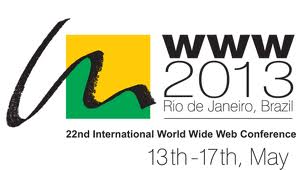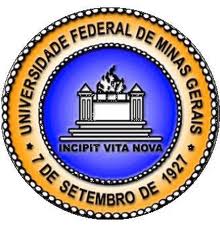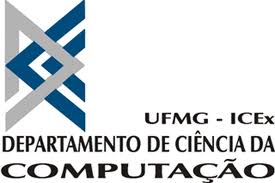
May 14, 2013
Rio De Janeiro, Brazil
Full-day Workshop

Second International Workshop on Privacy and Security in Online Social Media
Co-located with WWW 2013
With increase in the usage of the Internet, there has been an exponential increase in the use of online social media on the Internet. Websites like Facebook, YouTube, Orkut, Twitter, Flickr, Google+, FourSquare, Pinterest, and the likes have changed the way the Internet is being used. However, widely used, there is a lack of understanding of privacy and security issues on online social media. Privacy and security of online social media need to be investigated, studied and characterized from various perspectives (computational, cultural, psychological, etc.). It is critical to detect security threats and defend privacy through real-time and scalable systems. Since there are no logical boundaries for the social media, it is important to study the problem from an international perspective too. The goals of the workshop are:
- To create a platform to discuss latest and upcoming issues, trends, and cutting-edge research approaches in security and privacy in online social media / complex networked systems.
- To bring researchers who are working separately on security and privacy, and online social media, to discuss the problems that overlap and bring these two areas together.
Proceedings from the workshop will be published by ACM.
Awards
Congratulations to PSOSM 2013 winners!- Best Presenter Award: Blase Ur for "A Cross-Cultural Framework for Protecting User Privacy in Online Social Media."
- Honorable Mention for Best Paper Award: "Preserving User Privacy from Third-party Applications in Online Social Networks" by Yuan Cheng, Jaehong Park and Ravi Sandhu.
- Best Paper Award: "Faking Sandy: Characterizing and Identifying Fake Images on Twitter during Hurricane Sandy" by Aditi Gupta, Hemank Lamba, Ponnurangam Kumaraguru, and Anupam Joshi.
Program
| 1:00 - 1:30 PM | Introduction by Prof. Ponnurangam Kumaraguru and Prof. Virgilio Almeida |
| 1:30 - 2:30 PM | Keynote by Dr. Krishna Gummadi ABSTRACT |
| 2:30 - 3:00 PM | Break |
| 3:00 - 4:30 PM | Paper presentation session (3 full papers)
|
| 4:30 - 5:00 PM | Break |
| 5:00 - 5:30 PM | Invited talk by Prof. Bhavani Thuraisingham ABSTRACT |
| 5:30 - 7:00 PM | Paper presentation session (2 full papers & 2 short papers)
|
| 7:00 - 7:45 PM | Expert presentations / Open discussion on PSOSM |
| 7:45 - 8:00 PM | Concluding Remarks |
Abstracts of Speakers
Title:Extracting Trustworthy Information from MicroblogsSpeaker: Dr. Krishna Gummadi
Bio:
Krishna Gummadi is a tenured faculty member and the head of the networked systems research group at the Max Planck Institute for Software Systems (MPI-SWS) in Germany. He received his Ph.D. (2005) and B.Tech. (2000) degrees in Computer Science from the University of Washington, Seattle and the Indian Institute of Technology, Madras, respectively. Krishna's research interests are in the measurement, analysis, design, and evaluation of complex Internet-scale systems. His current projects focus on understanding and building social Web systems. Specifically, they tackle the challenges associated with protecting the privacy of users sharing personal data, understanding and leveraging word-of-mouth exchanges to spread information virally, and finding relevant and trustworthy sources of information in crowds. Krishna's work on online social networks, Internet access networks, and peer-to-peer systems has led to a number of widely cited papers and best paper awards at AAAI's ICWSM, Usenix's OSDI, ACM's SIGCOMM IMW, and SPIE's MMCN conferences.
Abstract:
Microblogging sites like Twitter have emerged as a popular platform for exchanging real-time information on the Web. Twitter is used by hundreds of millions of users ranging from popular news organizations and celebrities to domain experts in fields like computer science and astrophysics and spammers. As a result, the quality of information posted in Twitter is highly variable and finding users that are trusted and authoritative sources of information on specific topics is a key challenge. I will attempt to address this challenge in this two-part talk. In the first part of the talk, I will focus on understanding and combating spammer activity in Twitter. Users, especially spammers, resort to link farming to acquire large numbers of follower links in the social network. Acquiring followers not only increases the size of a user's direct audience, but also contributes to the perceived influence of the user, which in turn impacts the ranking of the user's tweets by search engines. I will first discuss results from our recent studies investigating link farming activity in the Twitter network and then propose mechanisms to discourage the activity. In the second part of the talk, I will focus on the problem of finding trustworthy topical experts in Twitter. I will propose a new methodology that relies on the wisdom of the Twitter crowds. Specifically, we leverage Twitter Lists, which are often carefully created by individual users to include experts on topics that interest them and whose meta-data (List names and descriptions) provide valuable semantic cues to experts' domain of expertise. I will first describe how we mined List information to build Cognos, a trustworthy expert search system for Twitter and then present results from a real-world deployment.
Title: Analyzing and Securing On-Line Social Networks
Speaker: Prof. Bhavani Thuraisingham, The University of Texas at Dallas
Bio:
Dr. Bhavani Thuraisingham is the Louis A. Beecherl, Jr. Distinguished Professor of Computer Science and the Executive Director of the Cyber Security Research and Education Institute (CSI) at The University of Texas at Dallas. She is an elected Fellow of IEEE, the AAAS, the British Computer Society, and the SPDS (Society for Design and Process Science). She received several prestigious award including IEEE Computer Society's 1997 Technical Achievement Award for “outstanding and innovative contributions to secure data management”, and the 2010 ACM SIGSAC (Association for Computing Machinery, Special Interest Group on Security, Audit and Control) Outstanding Contributions Award for “seminal research contributions and leadership in data and applications security for over 25 years”. She has unique experience working in commercial industry, research laboratory, US government and academia and her 30+ year career includes research and development, technology transfer, product development, program management, and consulting for the federal government. Her work has resulted in 100+ journal articles, 200+ conference papers, 100+ keynote and invited talks, five US patents (two pending) and twelve books.
Abstract:
Online Social Networks (OSN) are online applications that allow their users to connect by means of various link types. Since its inception in the mid 90s, social media has demonstrated exponential growth, making it the most popular activity on the world wide web. Two major technologies that have been developed for OSNs are (i) data mining technologies for analyzing these networks and extracting useful information such as location. demographics and sentiments of the participants of the network and (ii) security and privacy technologies that ensure the privacy of the participants of the network as well as provide controlled access to the information posted and exchanged by the participants. Our presentation will discuss both aspects. With respect to analyzing OSNs, our work has focused on mining for location and other attributes of individuals. In the first part of the presentation, we address the identification of the location of the user on social networking sites based on the location of his closest friends. We discuss the system we have developed called TweetHood, that outperforms the typical gazetteer-based approach in both accuracy and running time. The second part of the presentation will be on the security and privacy of OSNs. We explore how the online social network data could be used to predict some individual private trait that a user is not willing to disclose (e.g. political or religious affiliation) and explore the effect of possible data sanitization approaches on preventing such private information leakage, while allowing the recipient of the sanitized data to do inference on non private traits. In order to protect privacy, we sanitize both details and link details. We have designed and developed an extensible, fine-grained OSN access control model based on semantic web technologies. In particular, we model fine-grained social network access control system using semantic web technologies. Finally we will discuss directions for analyzing and securing OSNs.
Call for Papers
Topics / themes include, but not limited to the following:
- Information privacy disclosure, revelation and its effects in OSM and online social networks
- Collateral damage due to information leakage (e.g. through photo tagging) on OSM
- Privacy issues related to location based services on OSM
- Effective and usable privacy setting and policies on OSM
- Anonymization of social network dataset
- Identifying and preventing social spam (including phishing and frauds) campaigns
- Tracking social footprint / identities across different social network
- Detection and characterization of spam, phishing, frauds, hate crime, abuse, extremism via online social media
- Cyber-bullying, abuse and harassment detection, and prevention strategies
- Identifying and curbing malware, phishing, and botnets on OSM
- Filtering of pornography, viruses, and human trafficking on OSM
- Studying the social and economic impact of security and privacy issues on OSM
- User behavior towards change in privacy features in OSM
- Usability (including design flaws) of secure systems on online social media
- Data modeling of human behavior in context of security and privacy threats
- Privacy and security in social gaming applications
- Trust systems based on social networks
- Legal and ethical issues for researchers studying security and privacy on OSM
- Information credibility on OSM
- Security and Privacy issues in new entrants in OSM (e.g. Google Plus)
- Effect of OSM on conventional crime (robberies and theft)
- Means to maintain different legitimate identities on the same OSM service
- Access control, rights management, and security of social content
- Privacy-enhancing technologies, including anonymity, pseudonymity and identity management, specifically for the web
- Identifying fraudulent entities in online social networks
- Problems due to unification of different identities of the same persona on different social media services
- Using social media (e.g. Twitter) as sensors for decision making at the organization level (i.e. detecting outbreaks)
Accepted Papers
- Preserving User Privacy from Third-party Applications in Online Social Networks Yuan Cheng, Jaehong Park and Ravi Sandhu ycheng@cs.utsa.edu, jae.park@utsa.edu, ravi.sandhu@utsa.edu [PDF] | [Slides]
- A Cross-Cultural Framework for Protecting User Privacy in Online Social Media Blase Ur and Yang Wang blase@blaseur.com, ywang@syr.edu [PDF]
- How to Hack into Facebook without Being a Hacker Tarun Parwani, Ramin Kholoussi and Panagiotis Karras tarun.parwani@rutgers.edu, rk496@rutgers.edu, karras@business.rutgers.edu [PDF]
- Faking Sandy: Characterizing and Identifying Fake Images on Twitter during Hurricane Sandy Aditi Gupta, Hemank Lamba, Ponnurangam Kumaraguru and Anupam Joshi aditig@iiitd.ac.in, hemank08025@iiitd.ac.in, pk@iiitd.ac.in, joshi@cs.umbc.edu [PDF]
- A Study of Cyber-Security and Personality Traits Tzipora Halevi, Jim Lewis and Nasir Memon tzipihalevi@yahoo.com, JLewis@Poly.edu, memon@nyu.edu [PDF]
- Privacy Nudges for Social Media: An Exploratory Facebook Study Yang Wang, Pedro Leon, Lorrie Cranor, Alessandro Acquisti, Xiaoxuan Chen and Kevin Scott. ywang@syr.edu, pedrogln@cmu.edu, lorrie@cs.cmu.edu, acquisti@andrew.cmu.edu, cchen123@hotmail.com, kevinsco@andrew.cmu.edu [PDF]
- Twitter (R)evolution: privacy, free speech and disclosure trends in the UK and US Andrea Matwyshyn and Lilian Edwards amatwysh@wharton.upenn.edu, surliminal@gmail.com [PDF]
Important Dates
All submission deadlines are at 11:59PM IST.
| Manuscripts due | |
| Notification of acceptance | |
| Final revised manuscript | April 3rd, 2013 |
| Workshop | May 14th, 2013 |
** Best paper award will be given to the most outstanding paper submitted to the workshop.**
Organization
Workshop Organisers
- Prof. Ponnurangam Kumaraguru ("PK"), IIIT-Delhi, pk [dot] guru [at] iiit [dot] ac [dot] in
- Prof. Virgilo Almeida, UFMG
Program Committee
- Prof. Alessandro Acquisti, Associate Professor, Carnegie Mellon University, USA
- Dr. Mashhadi Afra, Researcher, Bell Labs Ireland
- Prof. Jussara Almeida, Associate Professor, Federal University of Minas Gerais (UFMG), Brazil
- Prof. Virgilio Almeida, Professor, Federal University of Minas Gerais (UFMG), Brazil
- Prof. Amitabh Bagchi, Assistant Professor, Indian Institute of Technology (IIT), Delhi
- Prof. Fabricio Benevenuto, Federal University of Ouro Preto (UFOP), Brazil
- Prof. Meeyoung Cha, Assistant Professor, Korea Advanced Institute of Science and Technology (KAIST), Korea
- Dr. Munmun De Choudhury, Researcher, Microsoft, USA
- Prof. Maura Conway, Faculty, School of law and Government, Dublin City University, Dublin
- Dr. Lipika Dey, Principal Scientist, Innovation Labs, Tata Consultancy Services, India
- Dr. Serge Egelman, Researcher, UC Berkely, USA
- Prof. Daniel R Figueiredo, Federal University of Rio de Janeiro, Brazil
- Prof. Niloy Ganguly, Associate Professor, Indian Institute of Technology, Kharagpur, India
- Prof. Anupam Joshi, Professor, University of Maryland Baltimore County (UMBC), USA
- Prof. Patrick Kelley, Assistant Professor, University of New Mexico
- Prof. Soundar Kumara, Pearce Chair Professor, Pennsylvania State University, USA
- Prof. Ponnurangam Kumaraguru, Assistant Professor, Indraprastha Institute of Information Technology, Delhi, India
- Prof. Mausam, Research Assistant Professor, University of Washington, USA
- Prof. Wagner Meira Jr., Professor, Federal University of Minas Gerais (UFMG), Brazil
- Prof. Sue Moon, Associate Professor, Korea Advanced Institute of Science and Technology (KAIST), Korea
- Prof. Animesh Mukherjee, Assistant Professor, Indian Institute of Technology, Kharagpur, India
- Dr. Amit Nanavati, Research staff member, IBM India Research Lab
- Dr. Sameer Patil, Research Scientist, Helsinki Institute for Information Technology, Finland
- Dr. Daniele Quercia, Researcher, University of Cambridge, UK
- Prof. Balaraman Ravindran, Associate Professor, Indian Institute of Technology, Madras, India
- Dr. Alessandra Sala, Researcher, Bell Labs Ireland
- Prof. Ravi Sandhu, Professor, University of Texas at San Antonio
- Prof. Caroline Sheddy, Computing Lecturer at DKIT, Ireland
- Dr. Steve Sheng, Senior Technical Analyst, Policy, ICANN
- Dr. L V Subramaniam, Senior Researcher and Manager, IBM - IRL, India
- Dr. Janie Tsai, North America Privacy Manager at Microsoft
- Prof. Vasudeva Varma, Professor, IIIT-Hyderabad, India
Sponsor for the best paper awards


 |
 |
 |
 |